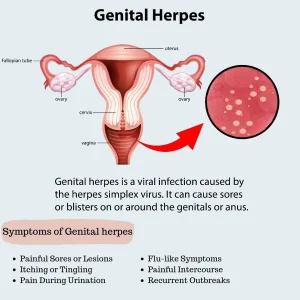Overview
Diagnosis
A diagnosis of genital herpes is typically made through a physical examination and a review of sexual history. Your healthcare provider will look for visible sores or blisters and ask about any related symptoms.
To confirm the diagnosis, your provider may take a sample from an active sore for laboratory testing. These tests can:
-
Detect the presence of the herpes simplex virus (HSV)
-
Identify whether the infection is caused by HSV-1 or HSV-2
In some cases, a blood test may be used to confirm herpes infection or rule out other possible infections.
Because genital herpes is a sexually transmitted infection (STI), your healthcare provider may recommend additional testing for other STIs. It’s also important that your sexual partner be tested for genital herpes and other STIs to prevent reinfection and further transmission.
Treatment
While there is currently no cure for genital herpes, antiviral medications can effectively manage symptoms, speed up healing, and reduce the risk of spreading the virus. Prescription antiviral pills are commonly used to:
-
Help sores heal more quickly during a first outbreak
-
Decrease the frequency of recurrent outbreaks
-
Lessen the severity and duration of symptoms during flare-ups
-
Reduce the likelihood of transmitting herpes to a partner
Common antiviral medications prescribed for genital herpes include:
-
Acyclovir (Zovirax)
-
Famciclovir
-
Valacyclovir (Valtrex)
Your healthcare provider will recommend the most suitable treatment based on several factors, including the severity of your condition, the type of HSV infection, your sexual activity, and your overall health. The dosage may differ depending on whether you have active symptoms or are managing recurrent outbreaks.
Long-term use of antiviral medications is generally considered safe and can significantly improve quality of life by reducing outbreaks and transmission risk.
Advertisement

